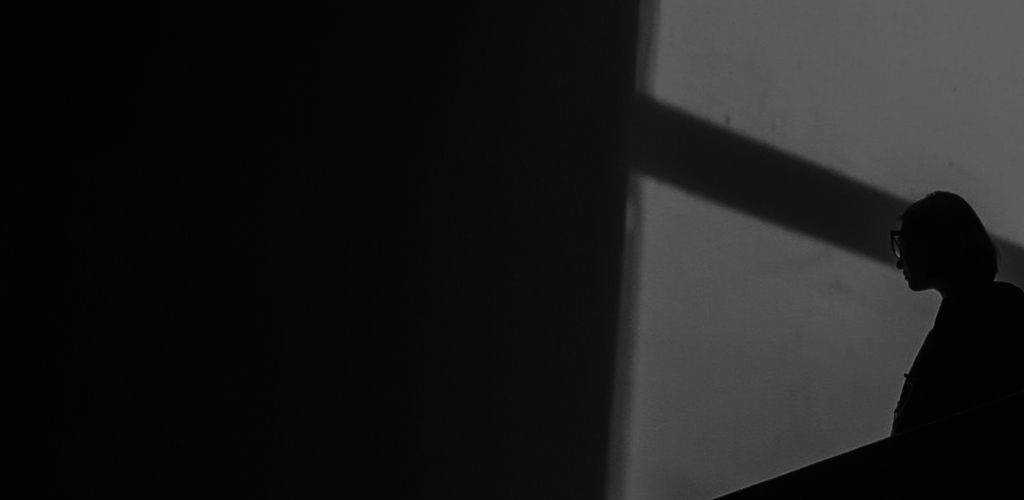My mother stands in my mind with her arms outstretched. Her chin is lifted, ever so slightly, to greet the sun that spills in through the window. Her fingers twitch as if touching the known elements of her day: my face as she says goodbye, the cup she’ll take three sips from on her way out of our apartment, the door, the lamppost, the coins she’ll drop in the cap of the beggar, the handle of the U-Bahn carriage, bannisters, walls, typewriter keys, the hand of a colleague who recently lost their parent or sibling in a bombing raid.
Her fingers still. I breathe her in – she smells of cold air and cigarettes barely veiled by perfume. I lie in my bed with the quilt up to my chin, my limbs curled in the foetal position, watching her. She turns to me. Here is where I wish something had happened. A coughing fit that required a glass of water. A question: what time will you be home this evening, Mutti? The caving in of my bedroom ceiling, because then, at least, we’d have gone together. I linger with that image: of limbs splayed beneath splintered wood and chunks of plaster, of the look on her face when she heard the first crack – confusion and self-preservation – and how she’d have lurched for me. I can feel her weight trying and failing to take the brunt of the debris, can almost feel the crack of the bedframe beneath me, the plunge through the floor, the life leaving my lungs. But I’m always awake, always accepting the kiss on my cheek, always saying goodbye. Bis später. Always listening to the clink of the cup, the rustle of coat pulled over dress, the protest of locks and hinges and a door meeting its frame.
*
My mother stands in my mind with her arms outstretched. If she could she’d twitch and tweak my neurons with her fingers, cause distractions and lapses. Bend pathways so they begin and end at her, arms and fingers sprawled, catching the early morning sunlight: so I am tucked up in bed and not standing in the spot where she spent her last moments decades before.
Is that her perfume? The scent strengthens as if she were bending to kiss my face, pull the quilt up higher beneath my chin. I wonder if they smelt her as they gripped her arms and pulled her from existence to execution. Perhaps she reminded them of someone they loved – a grandmother long buried, a mother dusting her portrait of the Führer, a wife with a blossoming belly and protesting spine. Perhaps they felt a weight in their diaphragm, as I do in my own, as they interrogated her in the bowels of the Alex when she was small and immobile. Her knuckles bloodied. Her fingers bent. Her lips sealed.
I shake my head, reach my own fingers into the space she might have occupied as the noose met her neck. I feel the weight of her on my shoulders and stumble – once, twice – but correct myself as if I could hold her up, stop the severing of her spinal cord, the crush of her windpipe. I stand with my arms above my head. Ich bin hier, Mutti. Ich bin hier.
But I’m too late. Always too late. On her last morning I ran into the hallway, opened the apartment door to find only her perfume loitering on the landing. I considered calling out her name, just to hear her footsteps backtrack, to see her face – tiny but there – at the bottom of the stairwell. I forgot to tell you, I’ll be late home, I’d have shouted. A stroll with Timo. She’d have winked, clasped her hands. Timo? Tell me about Timo. She’d have made her way up the stairs. You’ll be late for work, I’d have said. She’d have wafted my concern away. Instead I left her a note. I still have it – scrunched in a ball – in a drawer. A memento of guilt: of time I could have wasted, of a life I could have saved.
*
My mother stands in my mind with her arms outstretched. She tries to conceal the man, Herr Roth, from me as if he were a secret, but I walk around her. Not today, Mutti. I feel her fingers in my hair, or maybe it was just the breeze. Herr Roth points to a spot on the pavement.
He details my mother’s arrest in the manner of someone who was there or who has thoroughly researched his subject. His finger traces her trajectory from street to car; her first and last car ride through Berlin. Of course, her bag was full of anti-Nazi pamphlets, he says. I nod, feel pride seize my skin – my mother, the resistor, with her arms outstretched and her heart set on the days beyond dictatorship – but also the shame, the desperation to slide back in time, and delay her departure.
I could have saved her, I say to the cracked cobblestones rather than Herr Roth. He looks at me in the manner of someone about to learn of a great deceit. I could have called her back, made her late, I say, on the morning she was caught. I cross my arms, pinch my elbows. You couldn’t, he says. They’d have got her. The net was tightening. She knew. They all knew. I raise my eyebrows and he tells me how he knows this: his parents were dragged from his apartment on the same morning. He points at a second-storey window, takes a handkerchief from his pocket, and walks away. I’m left with my questions and condolences, and my mother’s image: her arms at her sides; her bag open at her feet with the pamphlets on show; her face turned towards me with her jaw clenched and her eyes fixed on mine.
…
Biography
Emma Venables’ short and flash fiction has been widely published in magazines and journals. Her short story, ‘Woman at Gunpoint, 1945’ was a runner-up in the Alpine Fellowship Writing Prize 2020. She has a PhD in Creative Writing and has taught at Royal Holloway, University of London and Liverpool Hope University. She can be found on Twitter: @EmmaMVenables.
Image: unsplash.com





